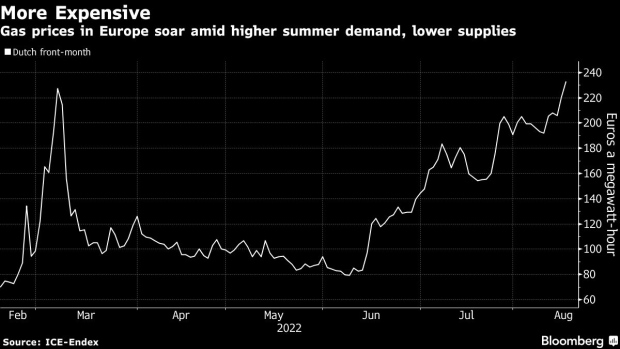Aug 16, 2022
European Gas Jumps Amid Rising Demand and Moscow’s Supply Grip
, Bloomberg News

(Bloomberg) -- Natural gas advanced to settle just below a record as a scorching summer in Europe triggers higher-than-normal demand, exacerbating an energy crisis that’s threatening to push major economies into recession.
Benchmark futures closed 2.6% higher, while electricity prices surged to an all-time high. Hot and dry weather is causing river water levels to drop rapidly, hampering the transport of energy commodities. It’s likely to force utilities to use more gas as a replacement at a time when supply from Russia continues to be limited.
“The seemingly inexorable move higher in European natural gas continued,” analysts at Deutsche Bank Research said in a note. “Prices have been bolstered by the latest European heat wave, which has seen rivers dry up and caused issues with fuel transportation, further compounding the continent’s existing woes on the energy side.”
The water level at a key point in the Rhine -- western Europe’s most important river for the transport of fuel and other industrial goods -- hit a new low this week, making it uneconomical for many barges to transit. Shallow levels are forecast to stay for the rest of the week. Energy prices in Europe have been soaring after Russia cut gas supplies, including via the key Nord Stream pipeline, slamming the region’s economy.
Dutch front-month futures, the European benchmark, settled at 225.91 euros a megawatt-hour in Amsterdam, more than 10 times higher than the seasonal average of the past five years. The record close was 227.20 euros on March 7, as Russia’s invasion of Ukraine was sending shock waves through the markets. The UK equivalent surged 4.6%.
Russian gas giant Gazprom PJSC said Tuesday that if the current trend continues, European gas prices could rise to the equivalent of about 347 euros per megawatt-hour this winter. That would take it above the record intraday price of 345 euros in early March.
Soaring energy costs throughout Europe are raising risks of gas rationing and blackouts in the winter when demand peaks. Kosovo, one of Europe’s poorest nations, imposed the region’s first rolling blackouts and the government urged people to cut consumption in a power crunch.
Turbine Trouble
Meanwhile, the standoff continues between Germany and Russia over a Nord Stream pipeline turbine that’s been stuck in transit after repair works were carried out in Canada. Moscow cut gas shipments through the link to 20% of capacity last month, citing technical problems. Germany’s Economy Minister Robert Habeck said Monday the turbine is available and that Russia was using the equipment as an “excuse” to cut supplies to Europe.
Germany has taken one of the biggest hits from the energy crisis as it is heavily dependent on Russian supplies. The government has urged lower consumption, warned of rationing and this week slapped a levy on gas use. It also signed a deal with the nation’s major energy companies to import liquefied natural gas through two new terminals this winter.
But LNG -- which has helped Europe fill up storage sites as Russian supply fell -- may also become more difficult to get as competition for cargoes ramps up. High temperatures are increasing demand in Asia, while companies in the region are also boosting purchases to stockpile for the winter.
Also read: Global Supply Crunch Sends Asian Gas Prices to Five-Month High
“There is a sense of urgency in South Korea, and to a lesser extent, Japan, to rebuild stockpiles ahead of winter as high temperatures have intensified withdrawals,” Olympe Mattei, a BloombergNEF analyst, said in a report.
Even so, an LNG cargo was sent from Australia to the UK via a ship-to-ship transfer in Malaysia, marking an unusual source of supply.
©2022 Bloomberg L.P.






